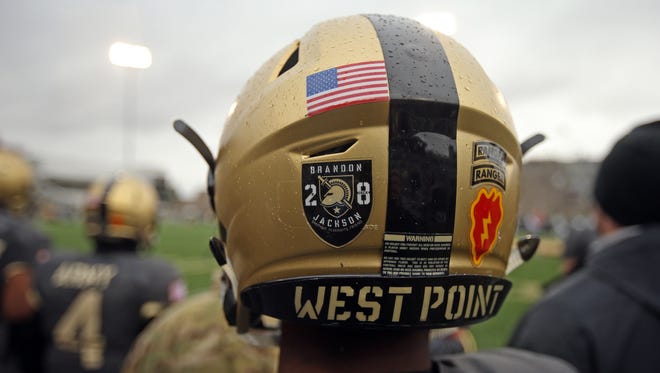Army finds success despite playing through tragedy

WEST POINT, N.Y. -- By some standards, this season has been a great one for Army’s defense.
— The unit ranks fifth among FBS teams with 288.9 yards allowed per game after finishing 51st in the same stat last year.
— On a landscape marked by increased offensive numbers in recent seasons, Army has held more than half its opponents to 14 or fewer points, a development that has helped the program recover after five consecutive losing seasons.
— Defensive coordinator Jay Bateman is a finalist for the Broyles Award, given annually to college football’s best assistant coach.
But painting the 2016 campaign in a positive light for the Army program, its defense, players and coaches would be to ignore a dark cloud that still hangs over the team as it approaches its annual season-ending matchup with Navy and the bowl appearance thereafter.
In the early morning hours of Sept. 11, sophomore cornerback and cadet Brandon Jackson died in a single-car accident about 20 miles south of the U.S. Military Academy.
Navy looks beyond injuries as it readies for Army
“He’s beloved by his teammates,” coach Jeff Monken said, alternating between past and present tenses. “We all loved the kid. He’s a great kid; happy kid, just full of life, enjoyed being here, being on this team, being around these guys, loved playing football, competed. I mean, he’s just a great guy.”
Jackson, a native of Queens, N.Y., earned a starting spot in Army’s defensive backfield during his freshman season and went on to lead the team in interceptions and rank second in solo tackles. But the loss of Jackson as a player, mere hours after the team improved to 2-0 on the season for the first time since 1996, meant little when compared with the loss of the 20-year-old Jackson as a person.

“It was the worst day of my life,” Bateman said. “Brandon Jackson was a great kid — my daughter’s favorite player, a competitor, a guy who showed up every day, a really talented kid, and a guy that every player on this team thought of as a friend.”
“I’m not sure I’m really past it,” said sophomore receiver Christian Poe, one of Jackson’s closest friends on the team. “I think about him every day and still catch myself tearing up sometimes. But I know if Brandon were still here, he’d want me to keep doing what I’m doing, so I’ve just got to keep grinding, and embrace my friends and my brothers.”
College football bowl schedule, results for 2016-17
Army players reference the team’s sense of brotherhood often, both when discussing what appealed to them about the academy’s football program as recruits and in describing the support system they’ve relied on while grappling with Jackson’s death. And in the days and weeks following the loss, Monken knew better than to try to turn his players’ grief into a rallying point. He said their sense of kinship — perhaps more than any resource made available to them following the tragedy — helped them persevere.
“When Brandon was here with us, we were playing for each other; we were playing for the brotherhood,” Monken said. “That’s all we’ve ever played for. That’s never going to change. Brandon will always be part of the brotherhood.”
“Football players, they come and go,” said senior linebacker Andrew King. “But Brandon as a person and as an individual is harder to replace — his charisma, his energy. ... We just try to push through it each day.”
Attending a service academy prepares Army football players for challenges entirely unlike those that will be faced by their counterparts at other schools — “Our kids are the toughest kids in the country,” Bateman said — but no amount of training could prepare a bunch of 18-to-22-year-olds for the shock and sadness associated with the unexpected loss of a friend. And to suggest the players, the defense and the program have triumphed over the adversity experienced in Jackson’s death would do a disservice both to the player’s legacy and his teammates’ humanity. The pain remains; the Army football team merely has succeeded alongside it.
“We just continue to talk to the guys about it, and about what it means to honor somebody, how to honor him,” Monken said. “You honor him by doing your best, just like you were trying to do the week before, when he was still here. I think that helped the guys just kind of move through any feelings that they had to do something different or do something else to try to. ... I don’t know. We just cope with it.”
Follow Berg on Twitter @OGTedBerg
